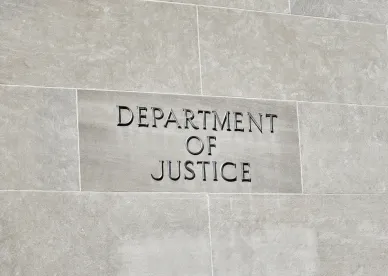The U.S. Department of Justice announced last Thursday that it had reached an agreement with First Merchants Bank, an Indiana state-chartered bank, to settle the redlining lawsuit that the DOJ filed against the bank on June 13, 2019 simultaneously with a settlement agreement and agreed order.
The agreement represents the second fair lending settlement entered into by the Republican-led DOJ under the Trump administration. (The first was entered into with KleinBank in May 2018.) More importantly, the settlement agreement recites that the bank was notified on June 5, 2017 that the DOJ had opened an investigation into whether the bank’s lending practices were discriminatory, suggesting that this may actually be the first redlining case to be initiated and resolved by the DOJ during the Trump administration.
The DOJ’s complaint, which relates to the bank’s residential mortgage lending business, including its home improvement loan and home equity line of credit programs, alleged that First Merchants violated the Fair Housing Act and the Equal Credit Opportunity Act by engaging in a pattern or practice of unlawful redlining of majority-Black areas in Indianapolis-Marion County. From 2011 to 2017, the bank was alleged to have avoided providing mortgage credit to individuals in these areas.
The redlining claim was based, in part, upon the allegation that First Merchants established and maintained a discriminatory Community Reinvestment Act (CRA) assessment area that was “horseshoe-shaped,” “excluding Indianapolis-Marion County and its 50 majority-Black census tracts from the Bank’s [CRA] assessment area, while including overwhelmingly white counties.” Even after an acquisition that resulted in the addition of Indianapolis-Marion County to its assessment area, the bank allegedly failed to open or operate a bank branch in any of the county’s majority-Black census tracts. The DOJ also claimed that the bank failed to meaningfully advertise in such census tracts. According to the complaint, First Merchants’ lending practices discouraged applicants in such census tracts from applying for loans, resulting in a disproportionately low number of applications and originations from such census tracts as compared to its peer institutions.
The DOJ also alleged that the bank’s mortgage loan policy contained a lending preference for customers within its branch footprint, which was based in majority-White areas. It alleged that the adoption of this policy “was intentional and willful, and has led to a large statistically significant disparity in the number of residential mortgage loan applications and originations First Merchants Bank has received from majority-White areas and majority-Black areas within the [bank’s assessment area] between 2011 and 2017.” The complaint alleges that the bank’s conduct constitutes discrimination on the basis of race in violation of the FHA and ECOA and a pattern or practice of “resistance to the full enjoyment of rights secured by the [FHA and ECOA]” and “unlawful discrimination and a denial of rights granted by the [FHA] to a group of persons that raises an issue of general public importance.”
Under the settlement agreement, First Merchants agrees to take various actions including:
-
Retaining an independent third party consultant to conduct an assessment of the bank’s fair lending risk management program and providing a report to the DOJ regarding the bank’s plans to adopt or implement the consultant’s recommendations
-
Maintaining a fair lending monitoring program
-
Providing training to all employees with significant involvement in mortgage lending, marketing, or CRA compliance within the lending area, all senior management, and all board members to ensure that their activities are conducted in a non-discriminatory manner
-
Engaging an independent third party consultant to conduct a community credit needs assessment
-
Designating a full-time Director of Community Development for the duration of the order (which is four years)
-
Having modified its CRA assessment area after the 2016 acquisition to include Indianapolis-Marion County, serving a lending area that includes the entire county
-
Opening one new full service branch in a majority-Black census tract in Indianapolis-Marion County
-
Opening one loan production office in Indianapolis-Marion County that is centrally located to multiple majority-Black census tracts and accessible to residents of those tracts through public transportation, advertising this location in a manner similar to which the bank advertises other branches, providing visible signage indicating the office’s location, placing a full-service ATM at the office, and maintaining regular business hours at the office
-
Spending a minimum of $125,000 per year on advertising, outreach, consumer financial education, and credit repair counseling, for a total of $500,000 over the term of the order
-
Meeting certain minimum requirements set forth in the order for advertising and conducting outreach within majority-Black census tracts during the term of the order, including, but not limited to: advertising each year in at least one print medium directed to African American readers in Indianapolis-Marion County; providing two outreach programs annually for real estate brokers and agents, developers, and others engaged in residential real estate-related business in majority-Black census tracts; developing a consumer education program for loan applicants from majority-Black census tracts in Indianapolis-Marion County on consumer finance and/or credit repair; and providing at least four outreach seminars annually targeted at residents of majority-Black census tracts in Indianapolis-Marion County
-
Investing a minimum of $1.12 million in a special subsidy fund to be used to increase the amount of credit that the bank extends to residents in majority-Black census tracts in Indianapolis-Marion County for home mortgage loans, home improvement loans, and home refinances, with a qualified applicant eligible for a subsidy of up to $7,500
The First Merchants settlement, like the KleinBank settlement, does not require the bank’s payment of a civil money penalty. This stands in contrast to previous redlining settlements under the Obama administration, such as those involving Hudson City Savings Bank and BankcorpSouth Bank.



 />i
/>i

